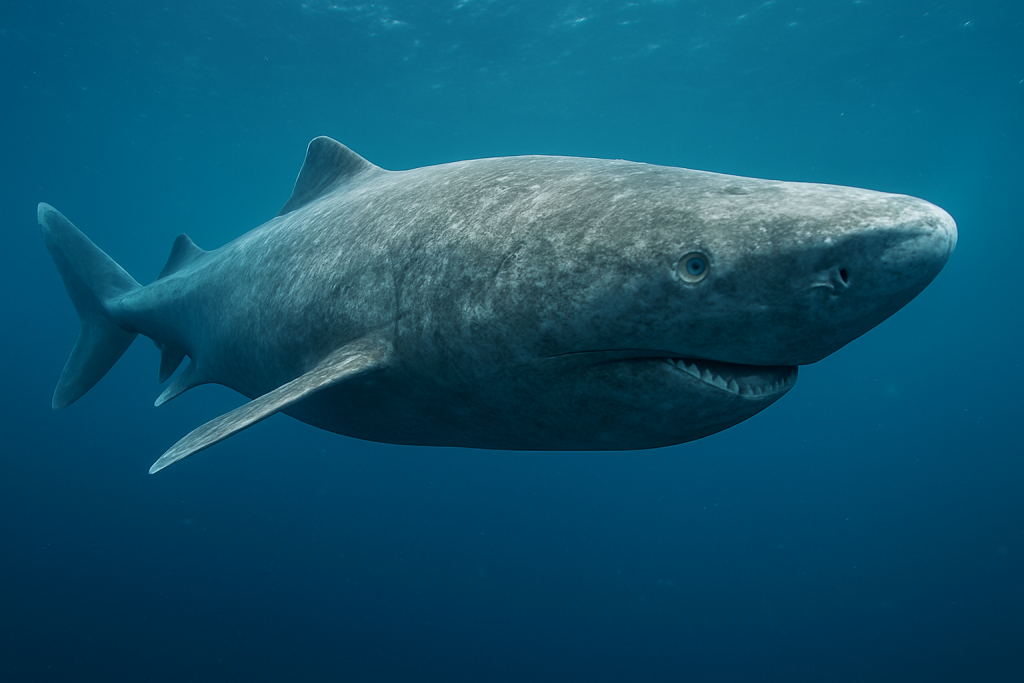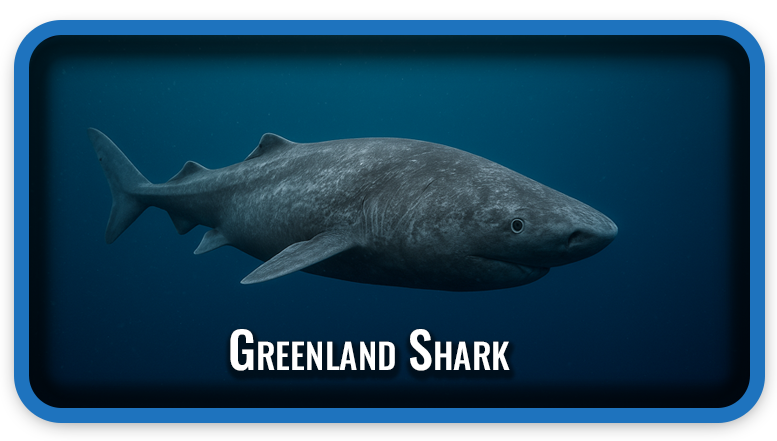⏲️ Estimated reading time: 4 min
Greenland Shark – The World’s Longest-Living Vertebrate. Discover the astonishing lifespan of the Greenland shark, a deep-sea giant that can live up to 512 years. Learn how scientists uncover its age, its slow growth, and why it’s among the most vulnerable species in Earth’s changing oceans.
Beneath the Ice: The Greenland Shark’s 500-Year Journey Through Time. An Ancient Mariner of the Deep
Beneath the frigid, inky waters of the North Atlantic, a remarkable creature drifts slowly and silently: the Greenland shark (Somniosus microcephalus). Moving with unhurried grace, it has witnessed centuries pass above without ever surfacing into the human world. Scientists now believe these sharks can live up to 512 years, making them the longest-living vertebrates known to science.
While many species in the ocean measure life in decades, Greenland sharks measure it in centuries. Most studied specimens are estimated to be over 200 years old, meaning some of those alive today may have been born when Shakespeare was still writing plays or when the Ming Dynasty flourished.
The Science of Measuring Centuries
How do scientists determine the age of a creature that lives so long? The answer lies in the shark’s eye lenses. These structures contain proteins that remain unchanged after their formation, retaining chemical markers from the environment at the time of the shark’s birth.
Using radiocarbon dating, researchers can trace these chemical signatures back hundreds of years. A groundbreaking 2016 study revealed one female Greenland shark to be around 392 years old, with a possible age range stretching even further into the past.

The Slowest Growth in the Ocean
One of the secrets behind the Greenland shark’s longevity is its extremely slow growth rate just about one centimeter per year. This glacial pace of development also delays their reproductive maturity, with females only becoming able to reproduce at around 150 years old.
While this is an extraordinary evolutionary adaptation for survival in cold, stable environments, it also leaves them highly vulnerable. Any decline in their numbers whether from fishing, climate change, or habitat disruption takes centuries to recover from.
A Vulnerable Ancient Legacy
The Greenland shark’s long life is both its greatest wonder and its biggest weakness. With such a slow reproductive cycle, populations cannot bounce back quickly. Overfishing, accidental bycatch, and environmental shifts pose serious threats to their survival.
Protecting these sharks isn’t just about conserving a species it’s about preserving living witnesses of history. Each Greenland shark carries with it a timeline of Earth’s oceans, spanning generations of human history.
The Silent Guardians of the Deep
As they drift beneath Arctic ice, Greenland sharks remind us how much we still don’t know about our oceans. They’ve survived centuries of change, yet modern human impact could undo that resilience in just decades.
In their slow, shadowed journey through the dark, they are more than just sharks they are time travelers, linking the past to the present. Protecting them ensures that this connection endures far into the future.
🔔 For more tutorials like this, consider subscribing to our blog.
📩 Do you have questions or suggestions? Leave a comment or contact us!
🏷️ Tags: Greenland shark, longest living vertebrate, deep sea creatures, marine biology, ocean conservation, Arctic wildlife, endangered species, slow growth animals, climate change impact, marine science
📢 Hashtags: #GreenlandShark, #LongestLivingVertebrate, #DeepSeaMysteries, #MarineConservation, #OceanLife, #WildlifeProtection, #ClimateChangeImpact, #ArcticOcean, #EndangeredSpecies, #MarineBiology
Final Thoughts
The Greenland shark is not just another marine predator it’s a living archive of history, an ancient mariner still cruising the depths as it has for centuries. Its story challenges us to think about life, time, and the delicate balance of our planet’s ecosystems. In protecting the Greenland shark, we’re not just saving a species; we’re safeguarding a living link to Earth’s deep past.
Only logged-in users can submit reports.
Discover more from HelpZone
Subscribe to get the latest posts sent to your email.

